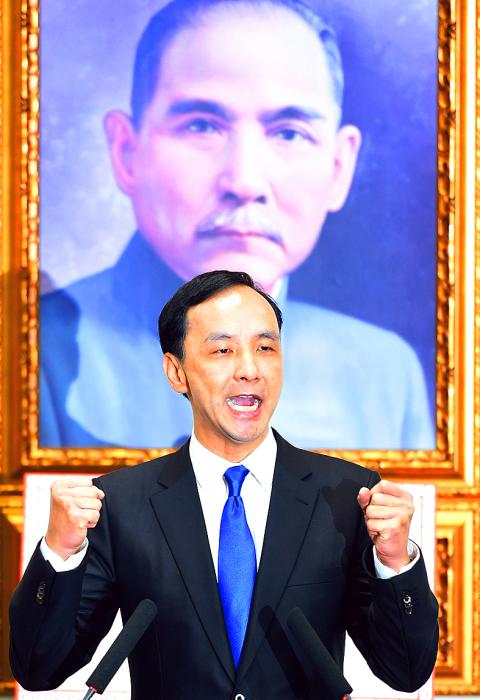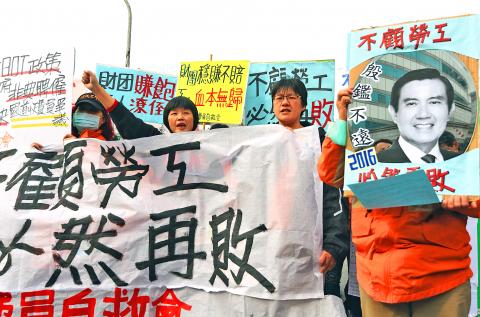Chinese Nationalist Party (KMT) Chairman Eric Chu (朱立倫) yesterday vowed to review the “impact of fast-paced cross-strait exchanges” and the “doubts” over the uneven distribution of benefits generated by cross-strait economic interaction, while adding that China should also face up to the problems.
The New Taipei City mayor made the remarks after he was inaugurated as party chairman, saying the problems were “undisputed.”
The principles the party’s cross-strait policies have been based on since it regained power in 2008, “peaceful development,” “mutual benefit” and “a win-win relationship” have guided cross-strait relations in the right direction, Chu said.

Photo: Chang Chia-ming, Taipei Times
“However, it is undisputed that the fast pace of exchanges in which both sides have engaged in close and intensive interaction have brought psychological impacts to us, because there is a very big difference between Taiwanese society and that [in China],” Chu said.
Chu added that cross-strait economic exchanges have raised concerns over whether the benefits generated have been shared fairly and equitably by the public and “we have to solemnly face up to those doubts.”
The KMT would thoroughly review the two issues and would put them up for discussion, with both sides having the chance to exchange views, Chu said.

Photo: Chien Jung-fong, Taipei Times
Chu urged authorities “on the other side of the strait” to look squarely at the issues as well because it takes both sides working together to maintain a “steady” pace in cross-strait relations and make the relationship sustainable.
During the speech, Chu reiterated his willingness to sit down with the opposition parties and push for the reforms needed to implement a constitutional system under which officials assume responsibility commensurate with their authority and discuss bills concerning issues related to livelihood to foster fairness and justice.
Chu also pledged to make the executive and legislative branches of government work in tandem to facilitate the implementation of policy and to open the party to the younger generation by recruiting more talented young people.
However, Chu made no mention of the party’s assets, although he had said during his campaign that all the party’s ill-gotten assets should be returned to the nation.
President Ma Ying-jeou (馬英九), who resigned as chairman following the party’s rout in the Nov. 29 elections last year, was one of the guests attending the ceremony.
The KMT was equipped with seven vice chairpersons under Ma’s leadership, including Chu.
Chu said he would retain former Taipei mayor Hau Lung-bin (郝龍斌) and former Chiayi mayor Huang Min-hui (黃敏惠) as vice chairpersons.
Vice President Wu Den-yih (吳敦義), former KMT secretary-general Tseng Yung-chuan (曾永權), Deputy Legislative Speaker Hung Hsiu-chu (洪秀柱) and former Greater Taichung mayor Jason Hu (胡志強) would not be reappointed, he said.
Executive Yuan Secretary-General Lee Shu-chuan (李四川) would be appointed secretary-general of the party, he said.
Lee, who worked for the Taipei City Government when Ma was mayor and Chu’s New Taipei City administration, is expected to play a major role in synchronizing the party, the executive and the legislative branches of government.
KMT Legislator Lai Shyh-bao (賴士葆) was appointed to replace KMT Legislator Alex Fai (費鴻泰) as chief of the policy committee.

US President Donald Trump yesterday announced sweeping "reciprocal tariffs" on US trading partners, including a 32 percent tax on goods from Taiwan that is set to take effect on Wednesday. At a Rose Garden event, Trump declared a 10 percent baseline tax on imports from all countries, with the White House saying it would take effect on Saturday. Countries with larger trade surpluses with the US would face higher duties beginning on Wednesday, including Taiwan (32 percent), China (34 percent), Japan (24 percent), South Korea (25 percent), Vietnam (46 percent) and Thailand (36 percent). Canada and Mexico, the two largest US trading

AIR SUPPORT: The Ministry of National Defense thanked the US for the delivery, adding that it was an indicator of the White House’s commitment to the Taiwan Relations Act Deputy Minister of National Defense Po Horng-huei (柏鴻輝) and Representative to the US Alexander Yui on Friday attended a delivery ceremony for the first of Taiwan’s long-awaited 66 F-16C/D Block 70 jets at a Lockheed Martin Corp factory in Greenville, South Carolina. “We are so proud to be the global home of the F-16 and to support Taiwan’s air defense capabilities,” US Representative William Timmons wrote on X, alongside a photograph of Taiwanese and US officials at the event. The F-16C/D Block 70 jets Taiwan ordered have the same capabilities as aircraft that had been upgraded to F-16Vs. The batch of Lockheed Martin

GRIDLOCK: The National Fire Agency’s Special Search and Rescue team is on standby to travel to the countries to help out with the rescue effort A powerful earthquake rocked Myanmar and neighboring Thailand yesterday, killing at least three people in Bangkok and burying dozens when a high-rise building under construction collapsed. Footage shared on social media from Myanmar’s second-largest city showed widespread destruction, raising fears that many were trapped under the rubble or killed. The magnitude 7.7 earthquake, with an epicenter near Mandalay in Myanmar, struck at midday and was followed by a strong magnitude 6.4 aftershock. The extent of death, injury and destruction — especially in Myanmar, which is embroiled in a civil war and where information is tightly controlled at the best of times —

China's military today said it began joint army, navy and rocket force exercises around Taiwan to "serve as a stern warning and powerful deterrent against Taiwanese independence," calling President William Lai (賴清德) a "parasite." The exercises come after Lai called Beijing a "foreign hostile force" last month. More than 10 Chinese military ships approached close to Taiwan's 24 nautical mile (44.4km) contiguous zone this morning and Taiwan sent its own warships to respond, two senior Taiwanese officials said. Taiwan has not yet detected any live fire by the Chinese military so far, one of the officials said. The drills took place after US Secretary